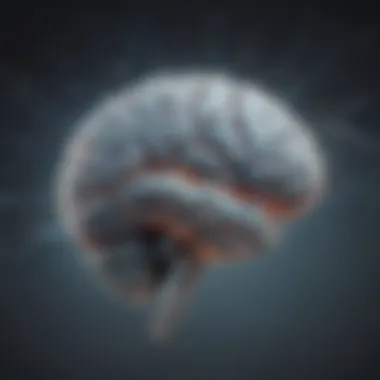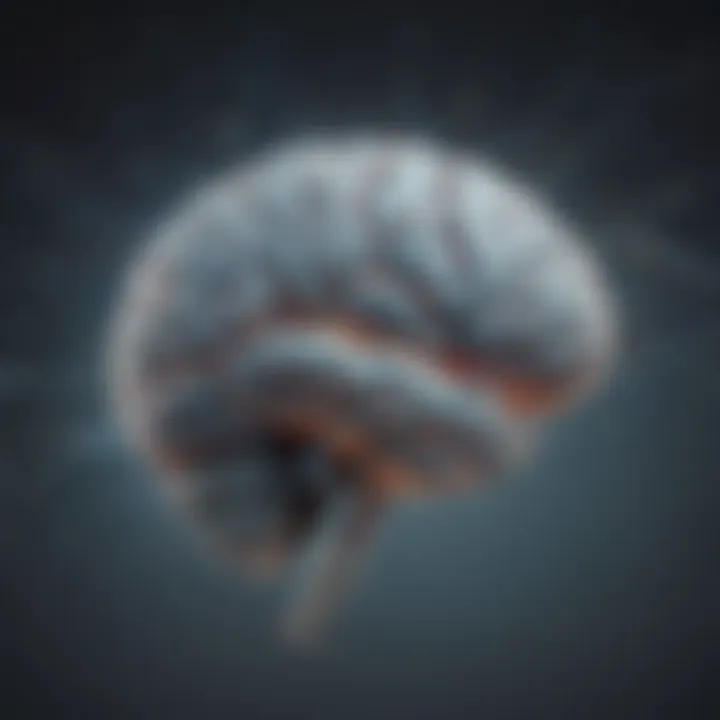Unlocking Your Cognitive Potential: Strategies for Peak Performance


Understanding Cognitive Potential
In exploring the nuances of cognitive potential, delving into actionable strategies that can be employed to optimize mental prowess is paramount. The human brain, a complex organ, holds immense capabilities waiting to be unleashed through systematic approaches. From neuroplasticity to mindfulness practices, understanding how these techniques influence cognitive functions is crucial in unlocking the brain's full capabilities.
Analyzing Cognitive Performance
Analysing cognitive performance entails a detailed examination of various brain hacks that can be utilized to enhance mental acuity. By dissecting the intricacies of neuroplasticity and mindfulness, it becomes evident how these factors contribute to cognitive optimization. This analysis aims to provide a comprehensive guide on leveraging these techniques to amplify cognitive performance to its utmost potential.
Implementing Brain Hacks
Implementing brain hacks involves a strategic incorporation of neuroplasticity and mindfulness practices into daily routines. By comprehending the mechanisms behind these techniques, individuals can effectively harness the power of their minds to improve cognitive functioning. This section explores practical steps and methods for seamlessly integrating brain hacks into everyday life, fostering optimal cognitive performance.
Cultivating Optimal Mental State
Cultivating an optimal mental state is essential in maximizing cognitive potential. Techniques such as neuroplasticity and mindfulness aid in shaping a conducive environment for cognitive enhancement. Understanding the importance of mindset and mental well-being in achieving peak performance forms the cornerstone of unlocking one's cognitive capabilities.
Understanding the Brain
In the captivating realm of cognitive enhancement and mental optimization, understanding the intricacies of the brain serves as the fundamental pillar. By delving into the depths of neurobiology and neuroplasticity, one can unravel the mystery behind cognitive potential. Understanding the brain unlocks a treasure trove of knowledge, offering insights into how our brain functions, adapts, and thrives. This section meticulously dissects the core concepts of neurobiology to provide a solid foundation for further exploration.
Neurobiology Basics
Neurons and Synaptic Connections
Neurons, the building blocks of our brain's communication network, play a pivotal role in transmitting crucial information through synaptic connections. These intricate pathways ensure the seamless relay of signals, contributing to various cognitive functions such as learning, memory, and decision-making. Understanding the intricate dance of neurons and synaptic connections unveils the essence of brain functionality, highlighting the marvels of neural communication.
Brain Regions and Functions


The brain, a complex organ comprising specialized regions, governs a myriad of functions essential for human cognition and behavior. Each brain region harbors unique responsibilities, orchestrating tasks ranging from motor control to emotional processing. Exploring the diverse functions of different brain regions sheds light on the fascinating interplay between structure and function, showcasing the versatility of the human brain.
Neuroplasticity Fundamentals
Adaptive Brain Changes
Adaptive brain changes underscore the brain's remarkable ability to reorganize itself in response to experiences and environmental stimuli. This phenomenon lies at the heart of neuroplasticity, shaping our brain's neural circuitry based on learning and adaptation. Unraveling the intricacies of adaptive brain changes unveils the brain's extraordinary capacity for growth and development.
Learning and Memory Formation
Learning and memory formation represent the cornerstone of cognitive enhancement, paving the way for acquiring new knowledge and retaining valuable information. The intricate processes involved in encoding, storing, and retrieving memories showcase the brain's adaptability and resilience. Delving into the nuances of learning and memory formation elucidates the mechanisms that drive cognitive evolution and intellectual prowess.
Optimizing Cognitive Functions
In this section of the article, we delve deep into the essential topic of optimizing cognitive functions. Understanding the significance of honing cognitive abilities is paramount in improving overall mental performance. By optimizing cognitive functions, individuals can sharpen their focus, enhance problem-solving skills, and boost memory retention. This segment sheds light on the various strategies and techniques that can be employed to maximize cognitive potential and achieve peak cognitive performance.
Mindfulness Practices
Meditation Techniques
Exploring the realm of meditation techniques unveils a powerful tool for fostering mindfulness and cognitive clarity. Meditation serves as a mental exercise that cultivates focus, reduces stress levels, and enhances emotional well-being. The intrinsic nature of meditation techniques lies in their ability to quiet the mind, promoting a sense of inner peace and heightened awareness. Embracing meditation practices can significantly improve concentration, creativity, and overall cognitive function, making it a quintessential component in the quest for cognitive optimization.
Focus and Attention Training
Diving into focus and attention training unveils a structured approach to enhancing cognitive abilities. These practices involve exercises that strengthen concentration, improve multitasking skills, and heighten mental agility. Focus and attention training methodologies aim to eliminate distractions, improve productivity, and enhance cognitive resilience. By incorporating these techniques into daily routines, individuals can experience a profound sharpening of mental focus, leading to improved cognitive performance and productivity levels.
Cognitive Enhancement Strategies
Brain Training Exercises


Within the realm of cognitive enhancement lie brain training exercises, a dynamic approach to optimizing mental capabilities. These exercises are designed to challenge cognitive functions, enhance problem-solving skills, and stimulate neural networks. By engaging in brain training exercises regularly, individuals can experience cognitive improvements in areas such as memory, reasoning, and information processing. The unique feature of brain training exercises lies in their adaptability to individual cognitive needs, making them a versatile and effective strategy for cognitive enhancement.
Memory Improvement Techniques
Delving into memory improvement techniques reveals an array of strategies aimed at enhancing cognitive retention and recall. These techniques focus on bolstering memory capacity, strengthening neural connections, and improving information retention. Memory improvement techniques play a pivotal role in optimizing cognitive functions by promoting efficient encoding and retrieval processes. By incorporating these techniques into daily practice, individuals can experience significant enhancements in memory recall, cognitive sharpness, and overall mental acuity.
Nutrition and Brain Health
Essential Nutrients for Brain Function
Omega- Fatty Acids
Omega-3 Fatty Acids are a cornerstone of brain health due to their numerous benefits. Their significant contribution to cognitive functioning and neuroprotection makes them a popular choice among those aiming to optimize brain performance. The key characteristic of Omega-3 Fatty Acids lies in their role in reducing inflammation and supporting the structure of brain cell membranes. These unique features offer advantages such as improved memory, enhanced focus, and overall brain health. While discussing Omega-3 Fatty Acids in this article, it is vital to highlight how their consumption can positively impact cognitive functions, making them a crucial element in the pursuit of peak brain performance.
Antioxidants and Brain Health
Antioxidants are vital for brain health, contributing significantly to the overall well-being of cognitive processes. Their role in reducing oxidative stress and combating free radicals underscores why they are a popular choice for individuals prioritizing brain health. The key characteristic of Antioxidants and Brain Health lies in their ability to protect brain cells from damage caused by harmful molecules. This unique feature ensures advantages such as improved cognitive function, enhanced memory, and reduced cognitive decline. When discussing Antioxidants and Brain Health in this article, it is crucial to detail how their incorporation into one's diet can positively impact overall brain function and cognitive longevity.
Dietary Tips for Cognitive Well-being
Brain-Boosting Foods
Brain-Boosting Foods are integral for enhancing cognitive functions and supporting optimal brain health. Their specific nutrients play a vital role in boosting brain performance and sharpening cognitive abilities, making them a beneficial inclusion in this article. The key characteristic of Brain-Boosting Foods lies in their capacity to provide essential vitamins and minerals that fuel brain function and promote neural communication. This unique feature offers advantages such as improved focus, enhanced learning, and heightened mental clarity. By discussing Brain-Boosting Foods in this article, readers can understand how dietary choices directly impact cognitive well-being and shape brain performance.
Hydration and Brain Function
Hydration is a fundamental aspect critical for maintaining optimal brain function and cognitive performance. Its role in supporting neural communication and ensuring brain clarity makes it a popular consideration in discussions on brain health. The key characteristic of Hydration and Brain Function is its ability to regulate neurotransmitter function and facilitate cognitive processes effectively. This unique feature provides advantages such as improved concentration, enhanced memory retention, and overall cognitive function. When detailing the significance of Hydration and Brain Function in this article, it is imperative to underscore how staying hydrated influences cognitive abilities and enhances overall brain performance.


Lifestyle Factors Impacting Brain Performance
In this section, we delve into the crucial role of lifestyle factors in influencing brain performance. Comprehending the impact of lifestyle choices on cognitive functions is paramount for achieving optimal brain health. Lifestyle factors encompass a wide array of components such as diet, exercise, sleep patterns, and stress management. These elements play a significant role in determining brain function, affecting memory, attention, and overall cognitive abilities. By understanding and optimizing lifestyle factors, individuals can enhance their brain performance and cognitive well-being.
Sleep Optimization
- Sleep Cycles and Brain Health: Exploring the intricate relationship between sleep cycles and brain health reveals the essential nature of quality sleep for optimal cognitive function. Sleep cycles consist of multiple stages, each playing a distinct role in brain regulation and restoration. Rapid Eye Movement (REM) and Non-Rapid Eye Movement (NREM) stages are vital for memory consolidation, emotional regulation, and overall brain health. Prioritizing sufficient and uninterrupted sleep to complete these cycles fosters cognitive rejuvenation and mental clarity. Understanding the nuances of sleep cycles empowers individuals to structure their sleep routines for maximum cognitive benefits.
- Tips for Quality Sleep: Effective tips for improving sleep quality are integral to enhancing brain performance and overall well-being. Establishing a consistent sleep schedule, creating a conducive sleep environment, and engaging in relaxation techniques before bedtime are key strategies for promoting restful sleep. Limiting caffeine and screen exposure before sleep, as well as incorporating regular exercise into daily routines, can significantly improve sleep quality. Implementing these tips leads to better sleep efficiency, cognitive function, and emotional resilience, offering a holistic approach to enhancing brain health.
Physical Exercise Benefits
- Cardiovascular Fitness and Brain Function: Highlighting the correlation between cardiovascular fitness and brain function elucidates the profound impact of exercise on cognitive abilities. Cardiovascular exercise enhances blood flow to the brain, promoting neurogenesis and neuroplasticity. Improved cardiovascular fitness correlates with enhanced cognitive performance, memory retention, and overall brain health. Integrating cardiovascular workouts into one's routine not only boosts physical health but also contributes significantly to increased mental acuity and cognitive longevity.
- Neuroprotective Effects of Exercise: Delving into the neuroprotective effects of exercise reveals its role in safeguarding the brain against degenerative processes and cognitive decline. Regular physical activity stimulates the release of neurotrophic factors, supporting neuronal health and neurogenesis. Furthermore, exercise mitigates inflammation, oxidative stress, and neuronal damage, bolstering cognitive resilience and brain function. Embracing exercise as a neuroprotective strategy aids in preserving cognitive function, enhancing mood, and reducing the risk of neurodegenerative disorders.
Embracing Cognitive Challenges
Embracing cognitive challenges holds a pivotal role in the context of optimizing cognitive potential through brain hacks. This section delves deep into the significance of pushing cognitive boundaries, thereby stimulating neural pathways and enhancing overall cognitive performance. By actively seeking out challenges, individuals can engage their brain in novel and complex tasks, fostering neuroplasticity and cognitive growth. Embracing cognitive challenges is not merely about testing one's intellectual capabilities but rather about embracing discomfort and uncertainty to spur cognitive development and enhance problem-solving abilities.
Learning New Skills
Neurogenesis and Skill Acquisition
In the realm of cognitive enhancement, the phenomenon of neurogenesis and skill acquisition plays a vital role in expanding neural networks and improving cognitive functions. Neurogenesis involves the birth of new neurons in the brain, which is crucial for learning and memory processes. Skill acquisition, on the other hand, pertains to the process of acquiring new capabilities or expertise through practice and experience. The intricate interplay between neurogenesis and skill acquisition contributes to cognitive flexibility, adaptability, and overall brain health, making it a cornerstone in the pursuit of cognitive optimization. With neurogenesis, the brain exhibits remarkable plasticity, allowing for the development of new skills and the adaptation to new challenges.
Challenging Mental Activities
Integrating challenging mental activities into one's routine is a strategic approach to enhance cognitive functions and promote neuroplasticity. Engaging in tasks that require problem-solving, critical thinking, and creativity pushes the brain to overcome obstacles, thereby strengthening neural connections and cognitive resilience. Challenging mental activities serve as catalysts for cognitive growth by prompting individuals to think innovatively, analyze complex situations, and strategize effective solutions. While these activities may pose initial challenges, they offer long-term cognitive benefits by improving memory, focus, and mental agility, positioning them as indispensable tools in the arsenal of cognitive enhancement.
Creativity and Cognitive Flexibility
Divergent Thinking Exercises
Creativity and cognitive flexibility are integral components of cognitive optimization, emphasizing the importance of divergent thinking exercises in expanding creative capacities and enhancing problem-solving skills. Divergent thinking involves generating multiple solutions or ideas from a single problem, fostering creativity and innovative thinking. By engaging in divergent thinking exercises, individuals can break free from conventional thought patterns, explore different perspectives, and unleash their creative potential. These exercises not only stimulate neural diversity but also improve cognitive adaptability and decision-making skills, making them essential practices for unlocking cognitive potential and promoting holistic brain health.
Embracing Uncertainty
Embracing uncertainty is a transformative approach in the journey of cognitive enhancement, challenging individuals to navigate ambiguity and unknown outcomes with confidence and resilience. Uncertainty serves as a stimulant for cognitive growth, encouraging individuals to embrace discomfort, adapt to change, and explore uncharted territories. By confronting uncertainty head-on, individuals cultivate resilience, curiosity, and problem-solving abilities, fostering cognitive flexibility and emotional intelligence. Embracing uncertainty empowers individuals to step outside their comfort zones, confront challenges with optimism, and harness uncertainty as a catalyst for personal and cognitive growth, making it a fundamental aspect of unleashing cognitive potential and maximizing mental performance.



